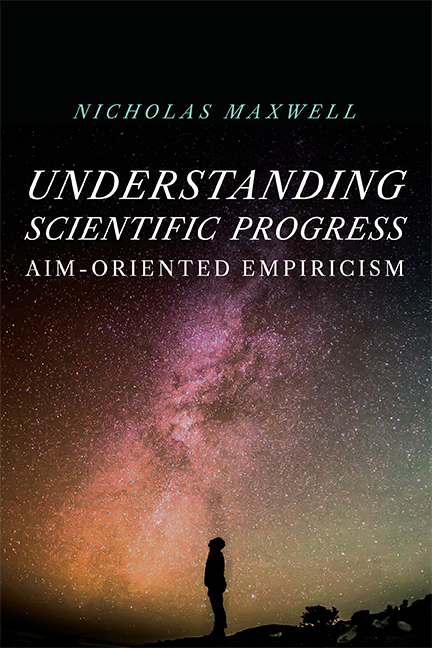Praise for Maxwell's book states it is evolutionary philosophy of science...
"Understanding Scientific Progress constitutes a potentially enormous and revolutionary advancement in philosophy of science. It deserves to be read and studied by everyone with any interest in or connection with physics or the theory of science. Maxwell cites the work of Hume, Kant, J.S. Mill, Ludwig Bolzmann, Pierre Duhem, Einstein, Henri Poincaré, C.S. Peirce, Whitehead, Russell, Carnap, A.J. Ayer, Karl Popper, Thomas Kuhn, Imre Lakatos, Paul Feyerabend, Nelson Goodman, Bas van Fraassen, and numerous others. He lauds Popper for advancing beyond verificationism and Hume’s problem of induction, but faults both Kuhn and Popper for being unable to show that and how their work could lead nearer to the truth." —Dr. Lloyd Eby teaches philosophy at The George Washington University and The Catholic University of America, in Washington, DC
"Maxwell takes up the philosophical challenge of how natural science makes progress and provides a superb treatment of the problem in terms of the contrast between traditional conceptions and his own scientifically-informed theory—aim-oriented empiricism. This clear and rigorously-argued work deserves the attention of scientists and philosophers alike, especially those who believe that it is the accumulation of knowledge and technology that answers the question."—Leemon McHenry, California State University, Northridge
"Maxwell has distilled the finest essence of the scientific enterprise. Science is about making the world a better place. Sometimes science loses its way. The future depends on scientists doing the right things for the right reasons. Maxwell's Aim-Oriented Empiricism is a map to put science back on the right track."—Timothy McGettigan, Professor of Sociology, Colorado State University - Pueblo
"Maxwell's aim-oriented empiricism is in my opinion a very significant contribution to the philosophy of science. I hope that it will be widely discussed and debated." -- Alan Sokal, Professor of Physics, New York University
"Maxwell has a great deal to offer with these important ideas, and deserves to be much more widely recognised than he is. Readers with a background in philosophy of science will appreciate the rigour and thoroughness of his argument, while more general readers will find his aim-oriented rationality a promising way forward in terms of a future sustainable and wise social order."—David Lorimer, Paradigm Explorer, 2017/2
"This is a book about the very core problems of the philosophy of science. The idea of replacing Standard Empiricism with Aim-Oriented Empiricism is understood by Maxwell as the key to the solution of these central problems. Maxwell handles his main tool masterfully, producing a fascinating and important reading to his colleagues in the field. However, Nicholas Maxwell is much more than just a philosopher of science. In the closing part of the book he lets the reader know about his deep concern and possible solutions of the biggest problems humanity is facing."—Professor Peeter Müürsepp, Tallinn University of Technology, Estonia
SCIENCE MAKES ASTONISHING PROGRESS in improving our knowledge and understanding of the world but philosophers, by contrast, have made no progress at all in explaining how this progress is possible, despite centuries of effort. Some of the world's greatest thinkers, from Hume, Kant and Mill to Russell and Popper, have struggled to solve philosophical problems about scientific progress, and have failed. Even Einstein confessed he was baffled by the problem of what it means to say of a physical theory that it is "unified", "explanatory", or in possession of what he called "inner perfection". In this book I set out to solve the eight most fundamental philosophical problems about scientific progress. These include the problem of induction, the problem of what it means to say of a physical theory that it is "unified", and the problem of specifying precisely what the progress-achieving methods of science are. The enhanced understanding of scientific progress that this provides has important implications both for science, and for our attempts to achieve progress in other areas of human life where progress is urgently needed and much less assured – above all, in the effort to achieve social progress towards a better, wiser world.
Contents
Preface
Chapter 1: Philosophical Problems of Scientific Progress
Chapter 2: Why Understanding Scientific Progress Matters
Chapter 3: Why Previous Attempts to Solve Problems of Scientific Progress Have Failed
Chapter 4: A First Step Towards Solving the Problem of Underdetermination
Chapter 5: Theoretical Unity
Chapter 6: What Possible Justification could there be for Accepting Unified Theories?
Chapter 7: The Solution to the Problem of Underdetermination
Chapter 8: The Solution to the Problem of Verisimilitude
Chapter 9: The Problem of Induction
Chapter 10: Scientific Method
Chapter 11: Rational Discovery
Chapter 12: Broader Implications: Natural Science
Chapter 13: How Science Might Benefit from Putting Aim-Oriented Empiricism into Practice
Chapter 14: Broader Implications: Aim-Oriented Rationality and Global Problems
Appendix One: Introductory Remarks on Symmetries of Physical Theories and Group Theory
Appendix Two: What it means to say T2 makes more precise predictions than T1
References
Index
Quotations from reviews of Maxwell's previous work, From Knowledge to Wisdom:
"Nicholas Maxwell's ambitious aim is to reform not only our philosophical understanding of science but the methodology of scientists themselves.... Maxwell's aim-oriented empiricism [is] intelligible and persuasive...the main ideas are important and appealing...an important contribution to the philosophy of physics." —J. J.C. Smart, British Journal for the Philosophy of Science
"Maxwell is advocating nothing less than a revolution (based on reason, not on religious or Marxist doctrine) in our intellectual goals and methods of inquiry.... There are altogether too many symptoms of malaise in our science-based society for Nicholas Maxwell's diagnosis to be ignored." —Professor Christopher Longuet-Higgins, Nature
"A humanist and philosopher, Maxwell presents his ideas with eloquence and conviction. This book will appeal to persons in many different disciplines—from science to social studies." —American Library Association
Maxwell's Article, "How to Tackle the Fundamental Crisis of Our Times."






